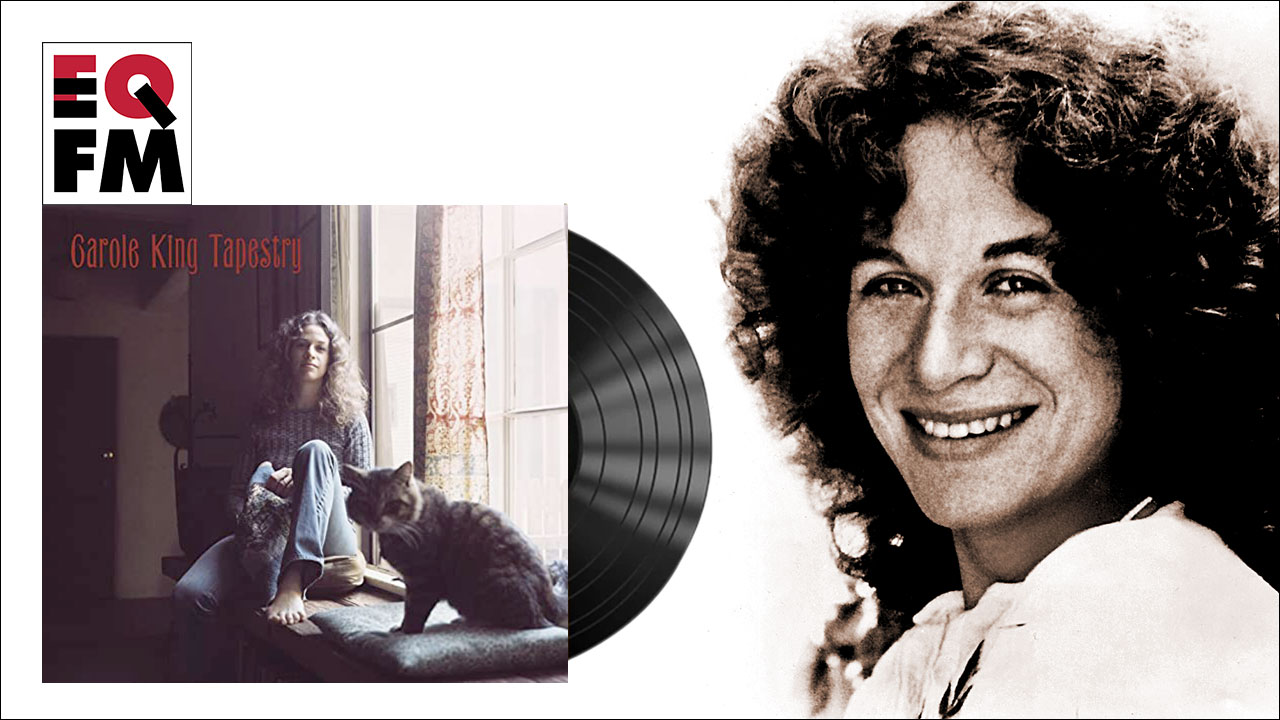Carole King: Tapestry

Carole King (Capitol Records publicity photo via Wikipedia)
Album ReCue, a part of FUV's EQFM initiative, takes an on-air and online look back at influential releases by women that altered our perspective not only of the artist, but her invaluable impact on music history. Above, listen to a conversation with Alisa Ali and Dennis Elsas about Carole King's Tapestry and below, Kara Manning's overview.
As the Sixties receded in the rearview mirror, Carole King had already experienced a lifetime’s worth of songwriting accolades as a Brill Building wunderkind, churning out hit after hit with her lyricist husband—and by 1968, very ex-husband—Gerry Goffin. The pair distilled romance into three-minute pop supernovas, sung by everyone from Aretha Franklin to the Monkees. Seriously, how many songwriters have had an entire Broadway musical (Beautiful) based on music written in their teens and twenties? King, that's who.
After the collapse of King's marriage to Goffin, she left New York for Los Angeles with her two daughters (and a cat named Telemachus). Her post-breakup spiritual odyssey led to two albums: 1968’s Now That Everything’s Been Said with The City, a trio of King, guitarist/vocalist Danny Kortchmar and bassist Charles Larkey, and in 1970, her solo debut, Writer. Finding that “everlasting vision of the ever-changing view,” in 1971 she recorded Tapestry, a stirring manifesto of what it means when a woman is given agency over her own voice and vision.
With Telemachus forever immortalized on the album’s cover, King and her grand piano reconfigured rock ‘n’ roll history. Tapestry won four Grammys in 1972, including Album of the Year, Song of the Year (“You’ve Got a Friend”) and Record of the Year (“It’s Too Late”). This quiet storm of an album was a Billboard chart buster, remaining at No. 1 for 15 consecutive weeks. Until it was surpassed by Adele’s 21 in 2017, Tapestry spent the most weeks on the Billboard 200 Chart for any female artist, at 318 (over six years), selling over 25 million copies worldwide.
As spare as a sketchbook of demos, and more provocative for that starkness, Tapestry was King’s way to heal, question, comfort, and motivate. Her innate razor-sharp pop perfectionism coalesced with the unruffled folk-rock ease of her Laurel Canyon life. There’s steel lining the softness of Tapestry’s sound, from the desolate, cascading chords of “So Far Away” to the minor key kiss-off of “It’s Too Late.” King’s songs of personal emancipation paralleled the feminist movement of that era; the seismic C minor springboard of “I Feel the Earth Move” was more than a mere rapturous love song, but a reveille of self-discovery. That King-like yearning and courage can be discerned in so many women who followed her, like Alicia Keys, Sara Bareilles and Lady Gaga.
Produced by Lou Adler, Tapestry was comprised of King’s own songs, a few older collaborations with Goffin, and two tunes with lyricist Toni Stern. Studio timing played a big role too. King and James Taylor, who was recording Mud Slide Slim and the Blue Horizon, shared King’s The City pal Kortchmar and drummer Russ Kunkel. As part of Taylor’s touring band, King played piano on his third album; he returned the favor on Tapestry with guitar and backing vocals. Joni Mitchell, recording Blue down the hall at A&M Studios, also sings on two tracks; the great Merry Clayton is on "Way Over Yonder."
While absolutely a defining classic for baby boomers, for a generation of Gen Xers, Tapestry was a well-worn member of the family record collection, as indelible as a photograph. Decades later, a swath of millennials stumbled onto Tapestry via the gateway of TV's “Gilmore Girls,” learning that the series' theme song (and Stars Hollow's cranky music shop owner) had a pretty amazing back story. There was an unforgettable Aretha belting out "(You Make Me Feel Like) A Natural Woman" to an astonished King during the 2015 Kennedy Center Honors. And a lucky audience in London’s Hyde Park in 2016 got to see King perform Tapestry in its entirety for the first time before 65,000 people of all generations, genuinely driving home the genius of King's nearly 50-year-old album.
"It might have been the Vietnam War, the violence, the cultural divide," King told Billboard in 2015, contemplating the reason why her second solo album was such a titanic hit. "People around the world have told me Tapestry helped them reconnect with basic human feelings when they really needed that."
Listen
WFUV's EQFM Album ReCue: Carole King's Tapestry

